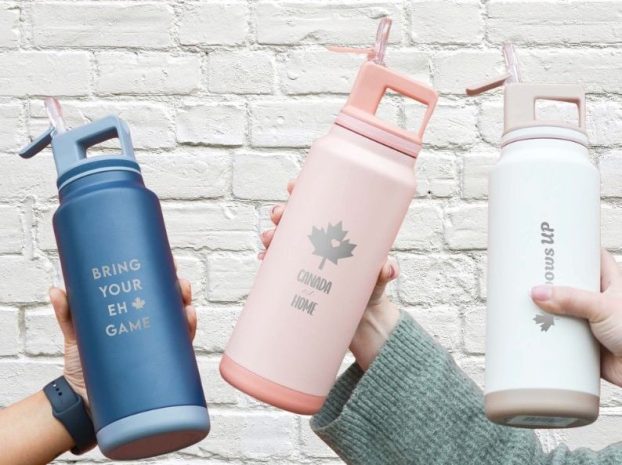Technology that makes cotton wrinkle-resistant is causing a giant ripple in the market for men’s casual pants.
In the fall of 1992, u.s. clothing manufacturer Haggar Inter-national launched a new line of cotton pants specially treated by means of a patented process to reduce wrinkling.
The process, which involves treating the cotton with a chemical formula and baking it in an oven, imparts a ‘memory’ on the fabric, enabling it to hold a permanent crease and resist wrinkles, even after washing.
Jim Scully, marketing manager with Dallas-based Haggar, says consumer response to the line has been so dramatic that, as of late last year, Haggar had sewn up 75% of the men’s cotton casual pants market.
Haggar’s u.s. success electrified the cotton apparel industry and sent competing pants manufacturers, including Levi Strauss, maker of Dockers, and Lee, which produces a cotton casual line under the Lee name, scrambling to develop similar technologies.
North of the border, Grand National Apparel of Toronto, distributor of the Haggar brand in Canada, began testing wrinkle-resistant Haggar in selected markets in November.
Jeff Otis, president of Grand National, calls the treated cotton ‘the most revolutionary product in my lifetime.’
Otis says sales have been so brisk Grand National is unable to keep up with the demand from its major customers, which include Eaton’s, The Bay and Sears department stores, independent men’s clothing stores, and sports pro-shops.
Canadian consumers have learned of the product’s existence primarily via u.s. tv and print media spillover from the u.s.
But in February, Hagar’s profile got an additional boost from Eaton’s, which launched a mixed-media ad campaign for the wrinkle-resistant brand, featuring point-of-purchase materials, radio spots and print ads in the Canadian editions of Time and Sports Illustrated.
Eaton’s is selling wrinkle-resistant Haggar for $59.99 a pair. Standard Haggar sells for $39.99 a pair.
Otis says the treated fabric performs well, adding the colors are rich and the technology minimizes the dry wrinkling from being worn that afflicts untreated cotton.
Grand National wants to introduce a line of wrinkle-resistant dress pants next, and is also investigating shirts, although the latter are apparently harder to treat because they are made with lighter-weight cotton fabric.
John Torella, a principal of Toronto-based John C. Williams Consultants, praises Haggar’s marketing approach as unique in the fashion industry, where manufacturers usually concentrate on selling to the retailer rather than the end-consumer.
‘The whole industry was caught flat-footed,’ Torella says. ‘But they are all catching up fast.’
For its part, Levi Strauss has already begun shipping a wrinkle-resistant line of Dockers to Canadian retailers.
The Markham, Ont.-based company’s advertising plans for the brand include a major consumer push leading up to Father’s Day, which falls on June 19.
Levi Strauss is not prepared to give out specific details, but Strategy understands the campaign will focus on print media, including ads in newspapers.
As well, the campaign is expected to include mall displays, transit shelters and vehicles and point-of-purchase materials.
Levi Strauss President Gord Shank says 6.5 million pairs of cotton casual pants are sold in Canada each year, but he declines to disclose his company’s share of the total market.
James Toccacelli, corporate communications manager with Levi Strauss, says the wrinkle-resistant Dockers being sold in Canada are made in the u.s. by parent Levi Strauss of San Fransisco.
But Toccacelli says if sales go well, future Canadian stock is likely to be made in Canada.
Lee-brand wrinkle-resistant cotton pants are also making their way into selected Canadian stores as part of a test being conducted by the brand’s Canadian distributor, Jack Spratt of Montreal.
Jack Kivenko, who, with brother Stan, owns Jack Spratt, says he is interested to see how wrinkle-resistant Lee performs in the market.
But he admits to being less enthusiastic than many about the quality, and, thus, the long-term market potential, of treated cottons.
Kivenko, whose company is a leading supplier of cotton casual pants to the Canadian market, says that, for one thing, treated cottons wear out more rapidly than untreated cottons.
For example, if the treated cotton is over-baked during the curing process, the tensile strength could deteriorate and the fabric could tear more easily.
Additionally, Kivenko says, u.s. marketers have gone overboard in their claims as to just how wrinkle-resistant, and revolutionary, their cottons truly are.
Kivenko says he is unconvinced that treated 100% cotton fabric can achieve any better wrinkle-resistance and quality than mixtures of polyester and cotton.
As well as men’s pants, Jack Spratt has also begun importing Lee-brand men’s shorts and pleated ladies’ pants in the new treated fabric.
Kivenko notes a large percentage of men’s clothing is bought by women – for their husbands or boyfriends – so it was felt to be a good idea to supply a women’s product, too.
While makers of national brand cotton casuals are moving quickly to capitalize on the wrinkle-resistant trend, retail chains specializing in store brand cottons appear to be slower off the mark.
Strategy contacted a number of chains, including Mark’s Work Wearhouse, Cotton Ginny, Benetton, The Gap, and also Dylex, which owns several chains, among them Harry Rosen, Tip Top Tailors and Fairweather, to ask whether they had begun carrying wrinkle-resistant products.
The only positive response came from Mark’s, which has begun testing a product under its Denver Hayes label.
Mark’s says that if demand is strong, it will offer a full product line in the fall.























